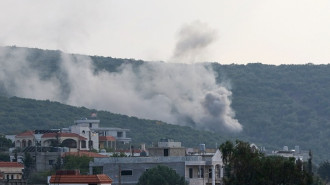Syrian regime jets pound Daraa after rebel attacks
The attack comes one day after rebel fighters targeted regime positions in the southern city.
"The regime's military jets launched more than 10 air raids on the neighbourhoods in Daraa within the past few hours," local journalist Sarah Hourani told The New Arab.
"Aircrafts dropped dozens of explosive barrels on these areas, leaving most neighbourhoods completely flattened to the ground."
Much of Daraa has been reduced to rubble, while the two sides continued to exchange fire through the shells of buildings, according to footage released by Syrian military media and the al-Qaeda-linked Abaa News agency over the weekend.
Local opposition activist Ahmad al-Masalmeh recorded 90 missile and bomb strikes by government forces by the afternoon.
Meanwhile, Syrian military media footage showed clouds of smoke and dust rising over the city.
The fighting has underscored the frailty of the "de-escalation" agreement brokered by Russia, Turkey, and Iran one month ago.
The three powers are supposed to guarantee ceasefires across four zones in Syria, including Daraa. Russia said it would delineate the four zones by Sunday, but no announcement has yet been made.
Earlier in the weekend, rebels, including al-Qaeda-linked fighters, attacked regime and allied positions in the city's Manshiyeh district.
"The regime sent 200 of its men to Manshiyeh yesterday. The fighters were afraid of an operation, so they attacked first," al-Masalmeh told AP.
The regime and its allies have sent reinforcements to the city, including at least seven tanks and 20 other armed vehicles, according to al-Masalmeh, who said rebels could see the regime's troop movements on the highway connecting Daraa to Damascus.
Daraa saw some of the earliest demonstrations against the Assad family's four-decade rule in 2011.
A violent crackdown by Bashar al-Assad's regime and the rise of an armed insurgency eventually plunged the country into civil war.
The six-year conflict has displaced half of Syria's population and claimed some 400,000 lives.





 Follow the Middle East's top stories in English at The New Arab on Google News
Follow the Middle East's top stories in English at The New Arab on Google News

![Algeciras port [Getty]](/sites/default/files/styles/image_330x185/public/75377010.jpeg?h=327453ef&itok=KfCFUEza)
